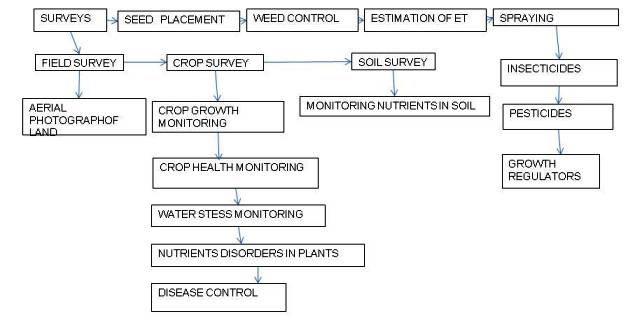फसल उत्पादन और सटीक कृषि के लिए मानव रहित हवाई वाहनों का अनुप्रयोग
Drones have great potential to transform Indian agriculture with the use of advance technology correctly. An unmanned aerial vehicle commonly known as a drone is an aircraft without human pilot or passengers on board which includes adding a ground based controller and a system of communication with the UAV.
Agriculture is the backbone of the Indian economy which plays the most decisive role in the socio economic development of the country. Over 70 % of the rural households depend on agriculture and it contributes about 17% to the total GDP and provides employment to over 60% of the population. Population increasing tremendously increases the demand of food.
The agriculture fields faces dramatic losses due to diseases. The disease come from the pest and insects which reduces the productivity of crop. Pesticides and fertilizers are used to kill the insects and pest in order to enhace the crop quality. The WHO estimates as one million cases of ill effected when spraying the pesticides in crop field manually.
Unmanned Aerial vehicle systems can help in crop production and precision agriculture. Drones provide real time and high quality aerial imagery compared to satellite imagery over agriculture area. Also application for localizing weeds and diseases determine soil properties detecting vegetation difference.
Agriculture drones benefits in basic applications like spraying, dripping and granule dropping. It could be used in seeds droping in forestry and plantation and induced pollination in seed production. Among all the remote sensing technologies, it is best to provide imagery data for crop field survey, soil health, pest identification, disease diagnosis, plant stress and growth monitoring.
Applications of Drone in Agriculture

The data thus helps in regulate crop health, crop treatment, irrigation, and carry out field crop damage assessment. Central government is promoting the use of “Kisan Drone” for crop assessment, digitization of land records, spraying of pesticides and nutrients for which provision has also been made in the budget. Modernization of the country agricultural sector is led by Prime Minister. The Chief Minister of M.P. inaugrated the first drone school that took wings in Gwalior.
Benefits of Drone technology in agriculture
As innovators introduce new technologies, their commercial uses increase day by day. The government has been easing restrictions for drone usage and is supporting startups to come up with novel ideas. As drone surveys become more common, they also become more cost-effective. In agriculture, they have a plethora of advantages. Some are as follows:
Enhanced Production-
The farmer can improve production capabilities through comprehensive irrigation planning, adequate monitoring of crop health, increased knowledge about soil health, and adaptation to environmental changes.
Effective and Adaptive Techniques -
Drone usage results in regular updates to farmers about their crops and helps develop strengthened farming techniques. They can adapt to weather conditions and allocate resources without any wastage.
Greater safety of farmers-
It is safer and more convenient for farmers to use drones to spray pesticides in terrains challenging to reach, infected areas, taller crops, and power lines. It also helps farmers prevent spraying the crops, which leads to less pollution and chemicals in the soil.
10 x faster data for quick decision-making -
Drone surveys back farmers with accurate data processing that encourages them to make quick and mindful decisions without second-guessing, allowing farmers to save the time invested in crop scouting. Various sensors of the drone enable capturing and analyzing data from the entire field.
The data can focus on problematic areas such as infected crops/unhealthy crops, different colored crops, moisture levels, etc. The drone can be fixed with several sensors for other crops, allowing a more accurate and diverse crop management system.
Less wastage of resources-
Agri-drones enables optimum usage of all resources such as fertilizer, water, seeds, and pesticides.
99% Accuracy rate-
The drone survey helps farmers calculate the precise land size, segment the various crops, and indulge in soil mapping.
Useful for Insurance claims -
Farmers use the data captured through drones to claim crop insurance in case of any damages. They even calculate risks/losses associated with the land while being insured.
Evidence for insurance companies-
Agricultural insurance sectors use Agri-drones for efficient and trustworthy data. They capture the damages that have occurred for the right estimation of monetary payback to the farmers.
Authors:
Shivani Sharma1 and Ankit Kumar Pandey*2
1L.N.C.T College Bhopal
2School of agriculture, Sanskriti University, Mathura
*Email address:
